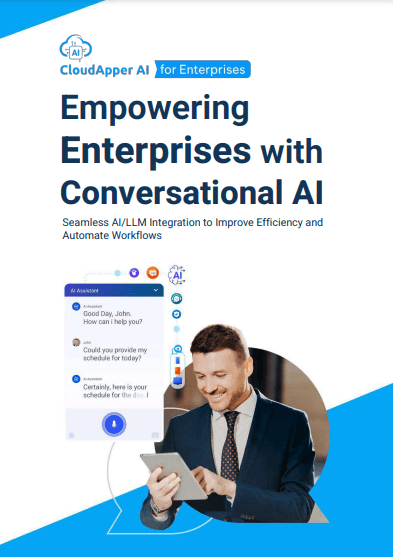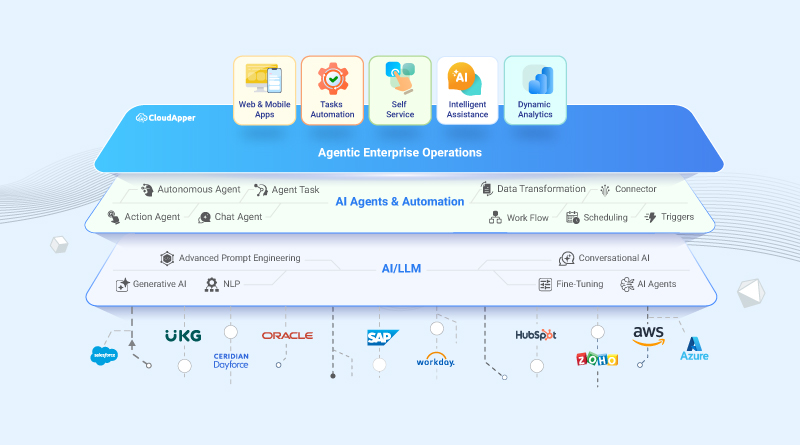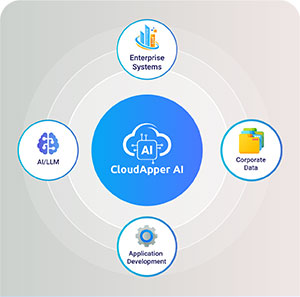Table of Contents
With its potential for better decision-making, more efficient operations, and more satisfying consumer experiences, artificial intelligence (AI) is quickly becoming a game-changer in many sectors. The need for enterprise AI solutions is growing as more and more companies see the value in AI. The choice of artificial intelligence platform is crucial for your business, but there are many things to think about before making a final selection. This all-inclusive buyer’s guide is designed to help prospective buyers through the maze of selecting the best Enterprise AI platform by covering important factors and offering insightful commentary.
Key Takeaways
When choosing the ideal enterprise AI platform, consider simplicity of implementation, security, user access, integration, and continuing maintenance. An effective AI platform automates repetitive activities, improves data accuracy, promotes personalization, scales efficiently, and allows for better decision-making. CloudApper AI demonstrates these features by providing seamless integration, extensive support, and advanced analytics to improve business operations and productivity.
Understanding Enterprise AI Software
It is critical to grasp the nature of AI software before exploring the factors to be considered when selecting an enterprise AI platform. Software with AI capabilities can mimic human intellect by applying techniques for deep learning, machine learning, and artificial intelligence. Perception, thinking, learning, and solving problems are all part of these duties. Chatbots for customer and employee support, repetitive task automation through conversational AI, and other AI-powered tools are finding widespread use in many different sectors.
AI boosts efficiency by automating routine tasks and improving data accuracy, which minimizes errors and enhances business decision-making.*
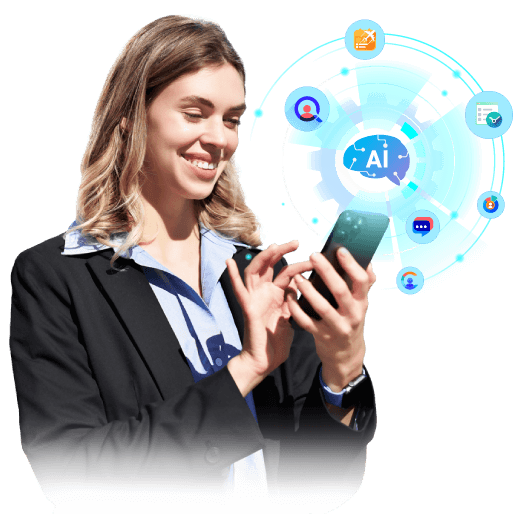
Benefits of Enterprise AI Platform
Before incorporating AI software into their processes, firms must understand its benefits.
Automates Routine Tasks: By eliminating the need for human interaction and automating routine processes, AI boosts efficiency.
Improves Data Accuracy: AI for enterprise ensures high accuracy and precision in data analysis, minimizing errors.
Enhances Personalization and Customer Experience: By collecting and utilizing customer data, AI enables personalized experiences, improving satisfaction and loyalty.
Increases Scalability: AI enterprise can scale operations efficiently, handling increasing workloads without significant resource investments.
Improves Business Decision-Making: AI for enterprise analyzes large volumes of data quickly and accurately, providing valuable insights for decision-makers.
AI high performers are five times more likely to spend over 20% of their digital budgets on AI.*
Common Features of Enterprise AI Platform
When evaluating AI software, understanding its common features is essential:
Machine Learning: Enables the implementation of machine learning algorithms on business data to identify relationships and trends.
Natural Language Processing: Processes and analyzes human language in text or audio form for tasks like sentiment analysis and language translation.
Predictive Analytics: Uses historical data and statistical modeling to predict future outcomes or events.
Speech Recognition: Processes audio signals for tasks such as transcription and voice search.
Virtual Personal Assistant: Provides personalized assistance based on user commands and queries.
Buyers Guide To Choosing the Right Enterprise AI Platform
Seamless Integration
According to a recent McKinsey report, integration issues account for 70% of AI project failures. Ensure the chosen enterprise AI solution seamlessly integrates with your existing infrastructure (ERP, CRM, etc.) to minimize change and maximize productivity. This allows a smooth transition and transforms your existing data into a valuable asset for your AI ambitions.
Integration issues account for 70% of AI project failures. Ensuring seamless integration with existing infrastructure is crucial for maximizing productivity.*
Robust Security Features
Security is essential. Enterprise AI solutions frequently handle sensitive client data; therefore, strong security measures are required. Look for systems that incorporate enterprise-level security standards throughout the development and deployment processes, adjusting to the changing cyber threat landscape.
Granular User Access Control with AI-powered Enhancements
Artificial intelligence has the potential to transform access control. Move beyond the traditional least-privileged model. Enterprise AI solutions can use AI to enable multi-factor authentication and biometric identification (facial recognition), which greatly improves security. This eliminates human error-related data breaches and improves your organization’s security posture.
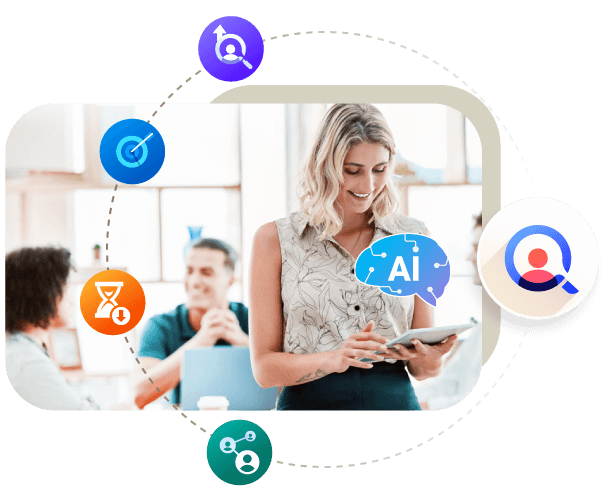
Actionable Insights with Advanced Reporting and Enterprise AI Chatbot Integration
Integration with other technologies like analytics, help desks, and IoT unlocks the actual value of AI in the organization. A well-integrated enterprise AI platform uses AI and analytics to evaluate large data sets, resulting in actionable insights that serve a wide range of business demands. Consider incorporating an enterprise AI chatbot to proactively answer client questions and streamline information access, thereby improving the customer experience.
Streamlined App Integration
In today’s globalized environment, flawless integration is essential. AI thrives on a steady influx of new data. Choose an enterprise AI solution that connects seamlessly with your existing applications. Regular testing and model updates assure peak performance by preventing obsolete data from jeopardizing AI efficacy.
70% of AI project failures are due to integration issues.*
Scalability for Future Growth
Enterprise artificial intelligence solutions are long-term investments. Scalability is critical because implementation times can differ. The platform you choose should adapt and evolve with your company, accommodating increased data volumes and potential new market entry over the next 5–10 years.
Ongoing Support and Training
The AI ecosystem is continually changing, necessitating ongoing learning. Think of training as a continuous process, not a one-time event. To ensure your staff adapts seamlessly to the changes AI brings to workflows and procedures, choose an enterprise AI solution supplier committed to providing extensive training and continuous support.
Pricing Considerations
Monthly subscriptions are the norm for AI software pricing. Plans with the most basic features start at $10 per month and go up to $250 or more. Prior to analyzing price possibilities, buyers should thoroughly assess their unique use case and requirements.
Considerations When Purchasing AI Software:
Several considerations should guide the purchasing decision for AI software:
Identify Your Use Case and Requirements: Understand your organization’s needs to choose the most suitable AI application.
Assess Accuracy and Performance: Evaluate AI software through case studies, testimonials, and trial periods to ensure it meets expectations.
Ensure Data Privacy and Security: Verify that the vendor follows strict data privacy and security protocols, especially when dealing with sensitive information.
Evaluate Training and Implementation Support: Look for vendors offering comprehensive training and ongoing support to facilitate a smooth adoption process.
The Best Enterprise AI Platform
If your company is looking for the best corporate AI platform, CloudApper AI is your best bet. It offers a smooth integration experience for sophisticated solutions and has a broad range of capabilities that reshape the AI adoption landscape. The implementation of AI-powered assistants, which are available 24/7, guarantees uninterrupted assistance for customers worldwide and is at the core of its greatness. This is particularly important for businesses that serve customers in several time zones since it increases customer happiness and strengthens the company’s reputation for reliability.
In terms of integration procedures and user-friendly interfaces, CloudApper AI really shines. Clients and consumers alike will appreciate how easy it is to use Conversational AI. Businesses can tap into AI’s potential without dealing with unneeded complexity because of CloudApper AI’s dedication to user experience.
By analyzing prior interactions and preferences, CloudApper AI provides individualized experiences, going beyond simple inquiry replies. Customers are greatly impressed by the amount of customization, which leads to meaningful conversations and an overall elevated customer experience.
By automating mundane procedures and operations, CloudApper AI significantly improves operational efficiency. In the end, the platform streamlines operations for firms by allowing staff to focus on higher-value activities by optimizing workflows and decreasing manual involvement.
The extensive support and training options of CloudApper AI demonstrate their dedication to continual progress. Businesses may take advantage of the platform in the long run since it takes AI’s ever-changing nature into account.
Enterprise AI solutions must adapt and evolve with your company, accommodating increased data volumes and new market entries over the next 5–10 years.*
One of its strongest points is its adaptability to many communication channels; it works with all the main ones and lets companies connect with their customers in meaningful ways. The platform also has tools for collecting feedback and ensuring compliance, which are crucial for companies that want to improve their services and stay on top of industry rules.
Ultimately, there are many factors to consider when deciding on the best enterprise AI platform; doing so calls for an in-depth analysis of business requirements and alternatives. Businesses may make well-informed decisions that support their long-term goals and objectives by thinking about things like security features, user access rights, integration possibilities, extensibility, simplicity of deployment, and continuing support and training. Choosing the correct platform is the initial stage in realizing artificial intelligence’s revolutionary potential in corporate processes.
FAQs
1. What factors should be considered when selecting an enterprise AI platform?
Key factors to consider are ease of implementation, security features, user access permissions, advanced reporting, integration with other programs, extensibility, and continuous support and training.
2. How does AI improve business decision-making?
AI improves decision-making by evaluating massive amounts of data fast and effectively, delivering useful insights that assist enterprises in forecasting market trends, identifying opportunities, and making informed decisions.
3. Why is integration essential for AI platforms?
Integration is critical since AI works best when fed a steady stream of new data. Seamless connection with other applications keeps AI models accurate and up to date.
*Disclaimer: Due to privacy reasons, the identity of the person or company cannot be revealed.
What is CloudApper AI Platform?
CloudApper AI is an advanced platform that enables organizations to integrate AI into their existing enterprise systems effortlessly, without the need for technical expertise, costly development, or upgrading the underlying infrastructure. By transforming legacy systems into AI-capable solutions, CloudApper allows companies to harness the power of Generative AI quickly and efficiently. This approach has been successfully implemented with leading systems like UKG, Workday, Oracle, Paradox, Amazon AWS Bedrock and can be applied across various industries, helping businesses enhance productivity, automate processes, and gain deeper insights without the usual complexities. With CloudApper AI, you can start experiencing the transformative benefits of AI today. Learn More

